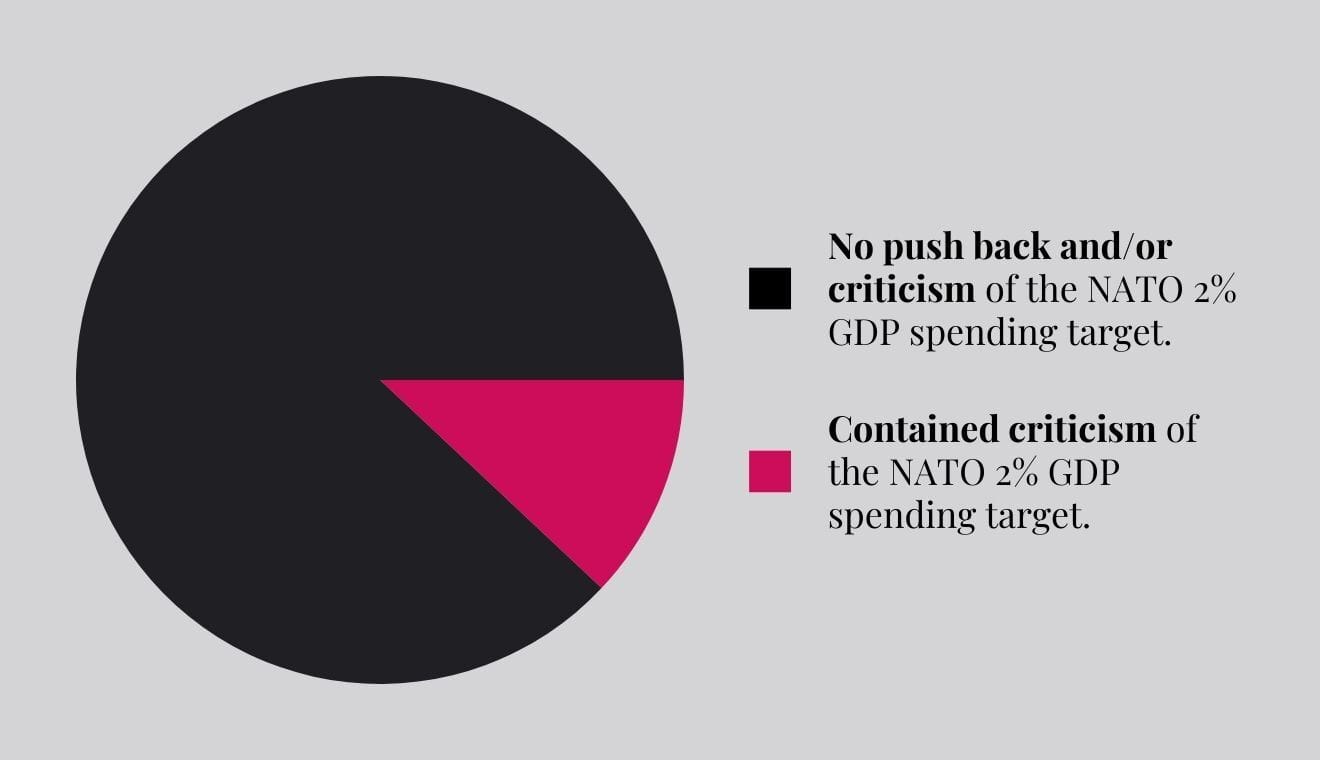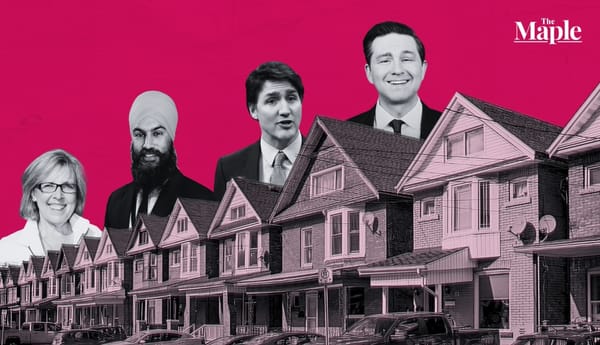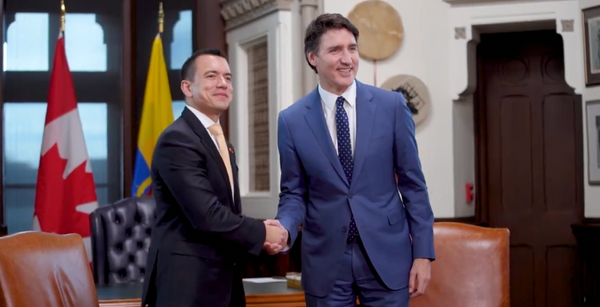The think-tank most often quoted by Canada’s largest newspapers on the issue of military spending is financially supported in part by arms dealers that have been awarded millions — and in some cases, billions — of dollars worth of government contracts, The Maple has found.
Despite frequently turning to the Canadian Global Affairs Institute (CGAI) and its affiliated fellows for expert opinion, the newspapers almost never disclose the organization’s sponsors and partners.
The Maple analyzed 100 original news articles published from February 2022 to July 2024 in Canada’s three largest newspapers: the Toronto Star, The Globe and Mail and National Post. All of the articles discussed the agreement that NATO member countries made in 2014 to spend at least 2 per cent of their gross domestic products (GDPs) on defence.
Canada has never met that target and has been under increasing pressure to do so, particularly following Russia’s invasion of Ukraine in February 2022.
In the articles surveyed by The Maple, experts from various organizations were quoted on 60 occasions about Canada’s defence spending and NATO’s 2-per-cent GDP target. On 53 of those occasions, the articles quoted experts who are affiliated with the military, organizations that receive donations from arms companies, or organizations that partner with the military.
In only one case did a newspaper, The Globe and Mail, explicitly disclose that an expert’s organization had received financial support from companies with a potential interest in increased military spending.
The Maple counted sources who were quoted as independent experts. The tally does not include elected officials, NATO officials, or government staff with no specific expertise on military affairs.
The findings are deeply troubling, said Rachel Small, an organizer with World Beyond War Canada.
“It’s misleading at best to the Canadian public and creates this one-channel narrative that the only thing that keeps us safe […] is to expand the military-industrial complex, which can’t be further from the truth,” she said.
Rather than keeping Canadians safe, Small said, NATO has created unnecessary militarization and violence, and has prevented Canada from developing a foreign policy independent from that of the United States.
“The idea that NATO should dictate how the Canadian GDP should be spent is just a laughable idea that has required enormous propaganda efforts, including in the Canadian media […] because it doesn’t actually fundamentally make sense,” Small said.
The vast majority of the articles surveyed by The Maple — 88 per cent — failed to include any pushback against the idea that NATO allies should spend at least 2 per cent of their GDPs on defence. One of the only voices to do so was Prime Minister Justin Trudeau, who was put on the defensive at this summer’s NATO summit in Washington.

In the remaining cases, criticisms of the target were largely made on the basis of fiscal viability, or the perceived superficiality or arbitrariness of the target, rather than on the basis of questioning further militarization.
Links To Major Contractors
By far the most popular think tank for reporters was the Canadian Global Affairs Institute (CGAI), with the organization’s leadership and affiliated fellows making up two-thirds of the quoted experts in the articles surveyed by The Maple.
CGAI is a charity with non-profit status that describes itself as “Canada’s most credible source of expertise on global affairs,” and “a leader in non-partisan, unbiased and independent analysis of Canadian public policy.”
On its website, CGAI says that its fellows, which include academics and individuals with industry experience, have agreed to affiliate themselves with the organization to “create a core of expertise that the Institute can draw upon for its research projects, its role as a responder to media contacts, and to fill the increasing demand for speakers on these topics.”
CGAI’s events and projects are financially supported in part by companies that could stand to benefit from increased defence spending, including the Canadian subsidiaries of some of the largest arms companies in the world.
Four of Canada’s 10 biggest defence companies are listed as supporters in CGAI’s most recent annual report. They are General Dynamics Land Systems - Canada, Irving Shipbuilding, Lockheed Martin Canada and General Dynamics Mission Systems - Canada.
All of these companies have signed multi-million or multi-billion-dollar contracts with the Canadian government in recent years.
The Department of National Defence (DND) also supports CGAI. Additional private-sector supporters include Boeing, which was awarded a $4.7-million-dollar military contract from Canada last year; BAE Systems and its subsidiaries, which have been awarded nearly $7 million in military contracts just this year; and the Swedish defence company Saab AB, which has been awarded multi-million-dollar contracts in the past decade.
CGAI’s president David Perry did not respond to The Maple’s request for an interview.
The Globe and Mail acknowledged CGAI’s financial support from the arms industry and DND once, in an April 19 article about a leaked Pentagon document.
In the article, Perry criticized the Trudeau government’s “overly-rosy talking points” on defence, adding: “As a country, we kind of seem to be deluded into thinking that our allies can’t do their own math and make their own assessments.”
According to the Globe, Perry also said that Ottawa’s current level of military spending was limiting the options for what it can undertake on the world stage.
In 15 additional articles surveyed by The Maple, the Globe quoted CGAI-affiliated experts, including Perry, without disclosing the organization’s financial supporters.
In a Globe article published in March this year, Perry said: “Our comparative stance in NATO is slipping appreciably. Canada is now the sole ally that doesn’t meet either of the NATO investment targets because we are falling way short of spending 2 per cent and we are also falling short of spending 20 per cent on equipment purchases.”
Spokespeople for the Globe did not respond to questions sent by email.
The Toronto Star quoted CGAI experts on 12 occasions in its articles without ever mentioning the organization’s financial supporters. Likewise, the National Post quoted CGAI experts on six occasions without disclosure.
The Toronto Star’s public editor Donovan Vincent told The Maple that the newspaper categorically rejects any suggestion that its coverage is misleading or serves the interests of the arms industry.
“In fact, the issue is far more complex. Global trends of instability and war, pressure from allies to step up and contribute more to collective defence, climate change that exposes the Arctic to adversaries and possibly threatens our sovereignty, widespread fears of another kind of Cold War with Russia/China and of course the war in Ukraine, are all part of this nuanced conversation,” Vincent said in an email.
“Rather than trying to boost the defence industry – we aren’t doing that at all, I must strongly repeat – we have explored the broad dialogue around this 2 per cent target and the changing global dynamic that most experts say is making the world more dangerous and unstable.”
Vincent’s response did not address The Maple’s primary question, which was why the paper does not disclose CGAI’s financial supporters.
Editors at the National Post did not respond to questions sent by email.
In other articles, the newspapers quoted business groups that include arms companies or their investors as members. The articles did not state that the members of those business groups had potential financial interests in increased military spending.
In an article published on January 2, the National Post quoted the CEO of the Canadian Chamber of Commerce arguing in favour of increased defence spending. The chamber’s members include the Aerospace Industries Association of Canada.
And when the Business Council of Canada warned in June that Canada risks “diplomatic isolation” if it doesn’t spend more on defence, the Toronto Star quoted its statement without noting that the council’s members include a representative of BlackRock, a major investment firm with hundreds of millions of dollars invested in arms companies with Canadian operations, such as L3 Harris and RTX (formerly Raytheon).
L3 Harris has been awarded more than a dozen defence contracts from Canada since 2019, ranging in value from $19,000 to $15.6 million.
Under its former name, Raytheon, RTX has been awarded $6.1 million worth of contracts with DND so far this year.
Defence Spending Already Soared
Since agreeing to NATO’s spending target in 2014, Canada has already increased its defence budget significantly from $18.5 billion to a forecasted $34 billion per year in 2024-25. The Liberal government plans to increase that spending even further to nearly $50 billion per year by 2029-30, an increase of 270 per cent in 15 years.
Canada still isn’t meeting NATO’s 2-per-cent target, however, and doing so would require even more money. The Parliamentary Budget Officer estimated in 2022 that meeting NATO’s target would require the government to spend a total of $75.3 billion more than originally planned by 2027.
This spending does not create peace, Small from World Beyond War argued, but further ties Canada’s foreign policy to the interests of the U.S. and the global arms industry.
“When we’re talking about bolstering NATO, this is not something that is separate from the horrific violence we’re witnessing right in Gaza right now,” Small said.
“Much like buying a pipeline, sending billions of dollars to buy and build these [weapons] systems is a commitment to keep using them over many years. The impact of that on Canada’s foreign policy and Canada’s role in the world is huge and will last decades.”
“When we’re talking about increased NATO spending, we’re talking about deeply controversial purchases of some of the most horrific military systems on the planet.”
Canada has recently committed to investing billions of dollars in some of the same weapons systems that Israel is using in its war on Gaza.
Canada has announced plans to buy $43 million worth of missiles from an Israeli state-owned company called Rafael Advanced Defense Systems; $36 million in drones from Israel’s largest private arms manufacturer, Elbit Systems; and $19 billion in F-35 fighter jets from Lockheed Martin, the same jets that Israel has been using to drop 2,000-pound bombs on Gaza.
Emma Paling is a journalist and writer in Toronto. Her award-winning reporting has been published widely by CBC News, The Breach, HuffPost and Vice.
Alex Cosh is the news editor of The Maple.








Member discussion